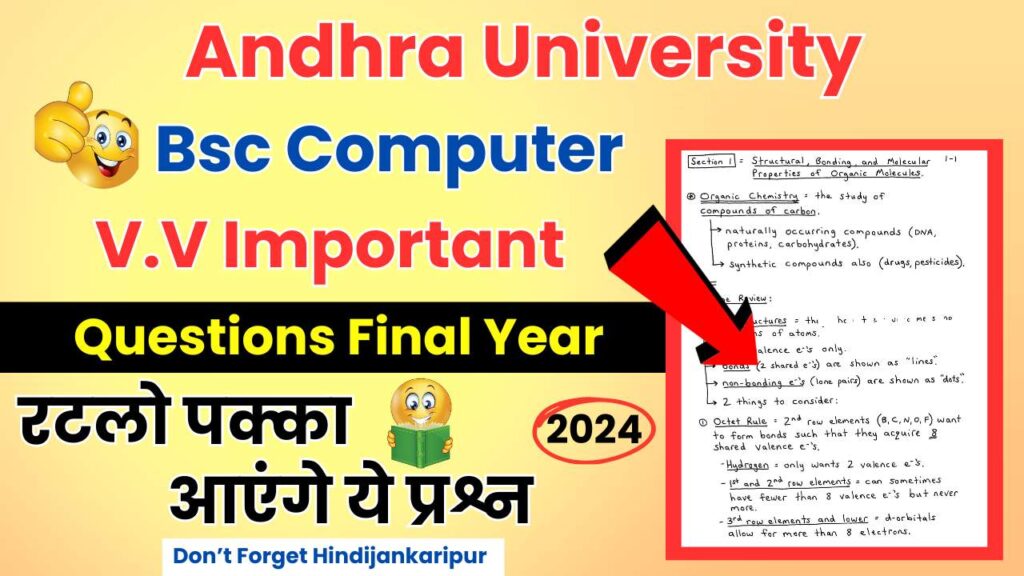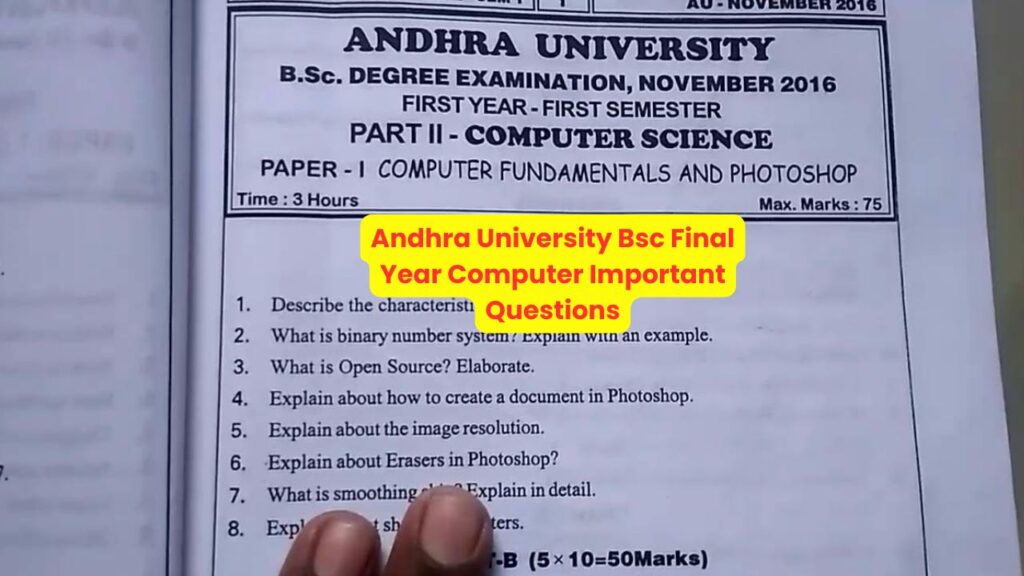Hello friends, do you want to know about Andhra University Bsc Final Year Computer Important Questions? Friends, welcome to this article, we will tell you all about the Andhra University Final Year Computer Important Questions.

Friends, we have collected all the important questions mentioned in this article from the Computer Science Important Questions. Friends, all these questions are very important.
As you know Computer Science is a very interesting subject, so in this article we have shared Andhra University Bsc Final Year Computer Important Questions.
Which will help you in studying, if you memorize these Important Questions mentioned in this article, then you can understand upto 60% syllabus, so friends, Read complete list of Andhra University Bsc Final Year Computer Important Questions, till the end.
Contents
Andhra University Bsc Final Year Computer Important Questions

Stacks and Queues:
Explain the concept of stacks and queues.
Describe the operations performed on stacks.
Write algorithms for stack operations (push, pop, peek).
Explain different types of queues (circular queue, priority queue).
Write an algorithm to implement a circular queue.
Linked Lists:
What is a linked list? Explain its types.
Write the algorithm to perform insertion and deletion in a singly linked list.
Describe doubly linked lists and their advantages over singly linked lists.
Explain circular linked lists and their applications.
Write a program to reverse a linked list.
Trees:
Define a binary tree. Explain the different types of binary trees.
Write algorithms for tree traversal methods (in-order, pre-order, post-order).
Explain binary search trees (BST) and operations on BST (insertion, deletion).
Describe AVL trees and how they maintain balance.
Explain the concept of a heap and write the algorithm for heap sort.
Graphs:
Define graphs and explain different types of graphs (directed, undirected, weighted).
Explain graph traversal techniques (BFS, DFS).
Write an algorithm for Depth First Search (DFS).
Explain Dijkstra’s algorithm for shortest path finding.
Describe the concept of Minimum Spanning Tree (MST) and algorithms for finding MST (Kruskal’s, Prim’s).
Subject: Database Management Systems (DBMS)
Introduction to DBMS:
Define DBMS and explain its advantages over traditional file systems.
Describe the three levels of data abstraction in DBMS.
Explain different types of database models (hierarchical, network, relational).
SQL and Query Processing:
Write SQL commands for creating, updating, deleting, and querying tables.
Explain the concept of joins in SQL and different types of joins (inner, outer, left, right).
Describe aggregate functions in SQL (COUNT, SUM, AVG, MIN, MAX).
Write SQL queries to demonstrate the use of subqueries and nested queries.
Normalization:
Explain the need for normalization in DBMS.
Describe different normal forms (1NF, 2NF, 3NF, BCNF).
Explain the process of normalization with examples.
Transactions and Concurrency Control:
Define a database transaction and ACID properties.
Explain concurrency control techniques (locking mechanisms, timestamp ordering).
Describe deadlock and methods to prevent and resolve deadlock.
Database Design and ER Model:
Explain the process of database design.
Describe the Entity-Relationship (ER) model and its components (entities, attributes, relationships).
Draw ER diagrams for given scenarios and convert them into relational schemas.
Subject: Operating Systems
Introduction to Operating Systems:
Define an operating system and its functions.
Explain different types of operating systems (batch, time-sharing, distributed, real-time).
Process Management:
Define a process and explain process states.
Describe process scheduling algorithms (FCFS, SJF, Round Robin, Priority).
Explain the concept of process synchronization and mechanisms (semaphores, monitors).
Memory Management:
Explain different memory management techniques (paging, segmentation).
Describe virtual memory and its implementation.
Explain page replacement algorithms (FIFO, LRU, Optimal).
File Systems:
Describe the functions of a file system.
Explain different file allocation methods (contiguous, linked, indexed).
Discuss the structure of directories and directory operations.
Deadlocks:
Define deadlock and necessary conditions for deadlock.
Explain deadlock prevention, avoidance, and detection techniques.
Describe methods for deadlock recovery.
Software Engineering
Software Development Life Cycle (SDLC):
Explain different phases of the SDLC.
Compare and contrast various SDLC models (Waterfall, Agile, Spiral, V-Model).
Requirements Engineering:
Define requirements engineering and its importance.
Explain techniques for requirements elicitation and analysis.
Software Design:
Describe different software design principles and methodologies.
Explain the concept of modularity and cohesion.
Describe design patterns and their types (creational, structural, behavioral).
Software Testing:
Explain the importance of software testing.
Describe different levels of testing (unit testing, integration testing, system testing, acceptance testing).
Explain different testing techniques (black-box testing, white-box testing).
Project Management:
Describe different aspects of project management.
Explain cost estimation models (COCOMO, Function Point Analysis).
Discuss risk management in software projects.
Related Posts
Andhra University Bsc Computers Operating System Important Questions
BSC 2nd Semester InOrganic Chemistry Important Questions In Hindi 2024! इस बार यही आएगा, जल्द देखिए
The above list covers the important questions that may be important for computer exam. By preparing well for these questions, students can cover a large part of their syllabus and perform better in the exam.
We hope that with the help of this article you have got information about Andhra University Bsc Final Year Computer Important Questions.
Friends, how did you like this post, please tell us in the comment section and if you have any questions, feel free to ask us in the Comment Box. If you find this post useful, please share it with others.